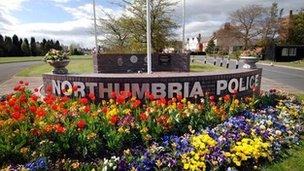Police and crime commissioner elections: Northumbria
- Published

Northumbria Police is made up of six area commands
On 15 November 37 police and crime commissioners will be elected in England along with four in Wales.
The PCCs, as they will be known, will be tasked with scrutinising their force and holding it to account. They will also be able to hire and dismiss the chief constable and set the force's budget.
The commissioners will be paid and are supposed to empower local people into having a say on how crime is tackled in their area.
Nominations for candidates in Northumbria have now officially closed.
BBC News has taken a look at each of the police forces ahead of the elections.
Northumbria Police
The PCC for Northumbria will be elected into post in November and will replace Northumbria Police Authority, which will oversee and lead the transition.
Northumbria Police is made up of six area commands which are based on local authority areas.
It is one of the largest police forces in England and Wales, serving more than 1.5 million people over 2,000 square miles.
Newcastle, Gateshead, South Tyneside, North Tyneside and Sunderland are all predominantly urban, while Northumberland has both urban and rural areas.
These area commands are supported by 12 specialist departments based at force headquarters in Ponteland.
Sue Sim is chief constable and Mark Gilmore is deputy chief constable.
The force's priorities are to reduce and prevent crime and disorder, increase confidence and address public concerns, protect the public and provide good value for money.
Northumbria Police currently has a workforce of 3,875 FTE (equivalent to a full time post) police officers, 1,499 FTE police staff and 419 FTE community support officers.
It faces challenges in tackling alcohol-fuelled violence, which it says is reducing but not as quickly as other forms of violence.
Funding
Northumbria Police is facing reductions in government funding, and as a result, the force has to save a total of £21.1m over 2012/13. This equates to police officer reductions of £7.4m, police staff reductions of £5.4m, and £8.3m in other areas.
Further budget savings of £33m will be saved in the period from 2013-15.
The force will have to reduce numbers of both police staff and police officer posts but it says it will protect "as far as possible" the numbers of officers involved in 24/7 response, neighbourhood policing teams, detectives who support neighbourhoods, and community support officers.
Neighbouring Durham Constabulary faces £23m of savings, with Cumbria Constabulary looking to make £18.7m savings.
In 2012/13, the force will get a government formula grant of £235.1m, a reduction of 6.7% on the previous year.
Total income from council tax in 2012/13 is £36.6m, based on a Band D council tax of £83.68 per annum.
The Band D council tax amount represents a zero increase from the figure agreed in 2011/12, which is the lowest across all police authorities in England and Wales.
Crime and performance
In 2011/12, crime in the force's area dropped by 8.4%, with 6,959 fewer offences recorded.
All area commands had a lower level of total recorded crime compared with 2010/11.
Most notably, violence against the person (with injury) decreased by 17.9%, and criminal damage reduced by 17% compared with the previous year.
The proportion of all crimes solved was 43.2% in 2011/12, the second highest in England and Wales.
Chief constable Sue Sim said: "Our success in reducing crime and disorder while increasing public confidence and satisfaction cannot be compromised as we work to improve our services whilst balancing a reduced budget."
- Published16 February 2011